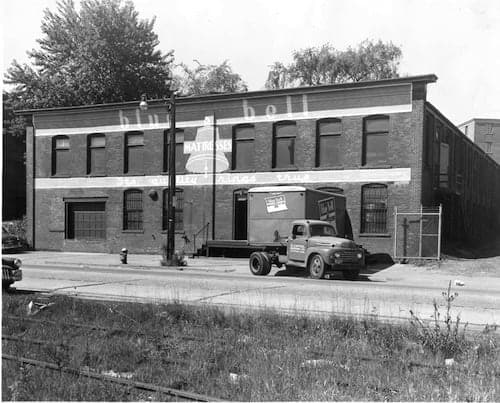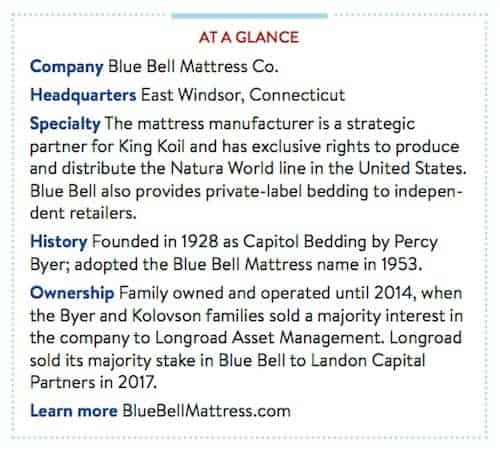BY GARY JAMES
New ownership, strategic partnerships and expanded manufacturing capacity set stage for growth

Heading toward its centennial in 10 years, East Windsor, Connecticut-based Blue Bell Mattress Co. is not resting on its laurels. On the contrary, the company recently took several big steps that significantly increased its production and distribution footprint, setting the stage for additional growth and expansion.
Consider just a few of the major developments of the past couple of years:
- In January 2018, King Koil, a mattress maker and licensing group based in Willowbrook, Illinois, announced a new strategic partnership with Blue Bell. King Koil is implementing a new business model that calls for much of its line to be directly manufactured at its own plant in Avondale, Arizona, and other company-owned facilities rather than produced by licensees, but Blue Bell remains a core partner to the brand. Under its agreement, Blue Bell will continue to manufacture and distribute King Koil products in states ranging from the Northeast to the Midwest from its 200,000-square-foot factory in East Windsor and its newly acquired facility in Roseville, Michigan. “Blue Bell is a historically strong partner for us with great ownership and an excellent management team,” says David Binke, King Koil chief executive officer, about the companies’ 50-year relationship. “The company is uniquely positioned to be a strong, committed King Koil partner through its recent expansion.”
- In December 2017, Blue Bell acquired Comfort Mattress Co. from retailer Art Van Furniture, which has headquarters in Warren, Michigan. The acquisition extends Blue Bell’s distribution from its core market in New England and the mid-Atlantic states to include the Midwest and 176 Art Van retail stores from Pennsylvania to Indiana. Blue Bell is running its Midwest production from Comfort’s 140,000-square-foot manufacturing facility in Roseville, which now operates under the Blue Bell Midwest banner, turning out the company’s full line of products, including the King Koil line, which also is carried by Art Van.
- In September 2017, Landon Capital Partners acquired a majority interest in Blue Bell. Based in Boston, Landon Capital Partners is the direct private equity investment group of the Landon Trust. Landon Capital Partners purchased Blue Bell from Stamford, Connecticut-based Longroad Asset Management, which bought the third-generation, family-owned manufacturer in 2014.
- In March 2016, Cambridge, Ontario-based Natura World announced it had signed a licensing agreement with Blue Bell to produce and distribute its line of natural and organic bedding throughout the United States.
“There’s no question: This has been a big period of change for us,” says Mark Kolovson, Blue Bell chief executive officer, about all the headlines the company has been generating. “But thanks to our talented team, we’ve been able to take on all of these challenges and put our company in a position where we’re stronger than ever and ready for a fast-changing competitive environment.”
“That’s a good business”
Blue Bell traces its roots to 1928, when Percy Byer, a recent immigrant to the United States, founded Capitol Bedding in New Britain, Connecticut. “Go into the mattress business. That’s a good business,” one of his friends had told him. Two years later, the company attracted two new partners and began supplying mattresses to local retailers.
In 1938, Capitol Bedding moved to an 18,000-square-foot building in Hartford, Connecticut, and, in 1952, it expanded its production capacity to 40,000 square feet.
In 1953, the company adopted a new name: Blue Bell Mattress. A logo of a blue bell was fashioned to convey the business’ fresh, upbeat image. In 1968, Blue Bell took another big step forward by becoming a King Koil licensee, and four years later, it moved into a new 50,000-square-foot facility in Windsor, Connecticut. In 1992, Blue Bell expanded into the New York market, accelerating growth once again.
In 2008, Blue Bell moved into its current, 200,000-square-foot headquarters and production facility in East Windsor. The additional space positioned the company to serve a fast-growing base of customers in nearby states such as Delaware, Maryland, New Jersey, Pennsylvania and Virginia.
Today, Blue Bell serves 1,000 store locations from Maine to Virginia and as far west as Illinois and Missouri. King Koil has long accounted for the lion’s share of sales, and Kolovson expects that strong track record to continue under the brand’s new business structure.
“Becoming a King Koil licensee in 1968 was an inflection point for our business,” Kolovson says. “That development transformed Blue Bell into a different kind of company. Our sales volume went way up, and so did our geography and market presence.”
With the King Koil brand being revamped under the direction of Binke and King Koil’s new Malaysian owner, Jin Hoe Yeoh, who serves as chair of the company, Kolovson says a new chapter in both companies’ storied histories is about to begin. (King Koil is celebrating its 120th anniversary this year.)
“We have a long relationship with David, whom we worked closely with when he was with King Koil earlier as executive vice president,” Kolovson says. “He has developed an exciting new approach for King Koil, which moves it away from the traditional licensing model that was so popular in the 1970s and 1980s but is not as relevant today. His new approach is built for the future — there will be fewer partners, and we will be more deeply connected.”
As a key strategic partner, Blue Bell is “singularly focused on working together as part of a newly unified King Koil,” Kolovson says. “David’s team and our team each have so many things we do well operationally at both the front end and the back end, and we are geared up to perform at a very high level to meet our customers’ demand for tailored products and services. It will be a true collaboration, with ideas and information flowing freely throughout the organization.”
The goal of the new model, according to Binke, is to enhance efficiencies, respond more quickly to market needs and help retailers more profitably grow their business. Under the new arrangement with King Koil, Blue Bell is responsible for sales and service of the brand in Delaware, Indiana, Kentucky, Michigan, New Jersey, New York, Ohio, Pennsylvania and West Virginia, as well as the New England region.

Fresh designs in the pipeline
One major initiative in the works is a complete update of the King Koil product lineup, with initial introductions expected at the Summer Las Vegas Market and another round at the winter show.
Kolovson couldn’t share details in advance of the product relaunches but says they will feature technologies aimed at improving comfort and the sleep experience. Several new models are being designed to be sold online by the company’s retailers; other models are being created to address new cost pressures caused by recent price hikes for steel and foam.
“David and his team are conducting a careful review of the entire King Koil line so that we can make sure that we are offering all the right products for these times,” Kolovson says. “In the next six months, a wide range of new models will be introduced that are innovative and designed to provide maximum value to the retailer — and the consumer. Everyone is working hard to get this done.”
A continuing cornerstone of the line will be the Laura Ashley collection, which has been a steady seller for King Koil since its introduction in 2008. “The Laura Ashley license has been a great asset,” Kolovson says. “It’s one of the most successful licensing programs in the industry, and we’re proud to be one of the largest distributors of the line.”
Another point of pride for Kolovson is the recent agreement Blue Bell signed with Art Van Furniture relating to the Natura line. Art Van agreed to carry the Natura line in its furniture and Art Van PureSleep stores in the Midwest.
The Natura mattresses sold by Art Van are being produced by Blue Bell in its newly acquired Michigan factory. The mattresses are designed with natural materials like organic cotton, wool and latex. “This was a very significant placement for Natura in the U.S.,” Kolovson says. “Art Van Furniture remains a leader in the sleep segment, and the Natura line fits perfectly with its merchandising plan. We are all proud that the Blue Bell product sold by the Michigan-based retailer is being made by Michigan residents.”
When the Natura license became available in 2016, Blue Bell saw it as a good complement to its core King Koil brand, Kolovson says. “The market for natural, organic and latex product is very robust. We saw this as a golden opportunity to provide our retailers with a unique, well-supported line of sleep products that will help them differentiate their floors and capture more market share.”
To help promote the revived Natura line, Blue Bell created a new 2,500-square-foot showroom in its East Windsor facility for Natura dealers. A dozen mattresses, ranging from organic to natural to hybrid styles, are on display, along with pillows, comforters, mattress toppers and pads.
“We see the Natura showroom as a lab for our current and future retail partners to learn more about the product’s selling points, as well as pick up ideas on creating a serene presentation on the retail floor,” says Richard Tauber, executive vice president of sales for Natura, Blue Bell and King Koil Northeast. In addition, the showroom allows the company to get early feedback on new designs before rolling out an entire program. Blue Bell also provides private-label bedding to the Bob’s Discount Furniture chain, based in Manchester, Connecticut.

A “gateway” to the Midwest
Always an important retail partner, Art Van’s relationship with Blue Bell deepened even further this year as Blue Bell integrated the newly purchased Comfort Mattress Co. factory into its operations. Overseeing the process has been Brian Chase, Blue Bell chief operating officer, “who has done a remarkable job of transferring and translating our company culture to the team in Michigan,” Kolovson says. “We have great people there who are dedicated to producing a quality product.”
The successful onboarding of the new factory has created a seamless operation across the company’s two locations, giving Blue Bell consistent product design and quality from both factories, Chase says. “Incorporating the second factory into how we operate, all of our systems and our attention to product detail have been critical in growing our business and maintaining our standards,” he says.
Art Van had used the factory to supply its traditional furniture and PureSleep bedding stores with a Michigan-made line. Now, the factory is supplying the Art Van store network with King Koil, Natura and private-label mattresses, including the Detroit Mattress Co. line. (Art Van currently operates in nine states, selling bedding under these store brands: Art Van Furniture, Art Van PureSleep, Scott Shuptrine Interiors, Levin Furniture, Levin Mattress, Wolf Furniture and Gardiner Wolf Furniture.)

The acquisition also gives Blue Bell “a great gateway” into the Midwest for its expansion strategy, which has accelerated thanks to the recent investment by Landon Capital. “The Comfort Mattress facility will enable us to provide our retail partners with quick delivery of our expanding portfolio of products,” Kolovson says. “It’s a strong base from which we can pivot west, east and south with both branded and private-label merchandise.”
To support all this growth, Blue Bell has beefed up its sales leadership team with several recent promotions and new hires. Earlier this year, the company promoted Leah Shaffer and Jonathan Gaspari to vice president of sales. Both work on large key accounts; Shaffer also is leading sales for Natura.
“Leah and Jonathan have been instrumental in our growth over the past couple of years,” Kolovson says. “Our portfolio of retail customers continues to grow and, under our new strategic alliance with King Koil, we expect even greater things as we expand our reach into the Midwest.”
The two executives report to Rebecca Gray, senior vice president of sales and marketing; and Tauber, both of whom were promoted in spring 2017.
“Much of our significant growth over the past couple of years can be attributed to Richard and Rebecca’s diligent work,” Kolovson says. “They’ve built an impressive sales network that continues to make an impact in our marketplace.”
In addition, in May 2018, Blue Bell further strengthened its senior management team by hiring David Brault as its first chief financial officer. Brault, who has more than 25 years of experience in corporate finance, oversees budgeting, strategic forecasting and financial analysis. He reports to Kolovson.
“With our recent growth, it became clear that we needed additional depth and financial expertise on our management team, and David is the perfect fit for this new position,” Kolovson says. “His analytical skills and people skills will enable him to make immediate contributions to our team.”

A new type of company
During the past few years, following the initial sale to Longroad Asset Management in 2014 and then the acquisition by Landon Capital Partners in 2017, the pace at Blue Bell has “definitely quickened,” Kolovson says. “Until then, we were a relatively small, family-owned company that concentrated basically on one brand and one region.”
From the early 1990s until 2017, Blue Bell was led by Kolovson and Steve Byer, Kolovson’s brother-in-law and grandson of company founder Percy Byer. Kolovson’s focus was on sales, and Byer’s specialty was production and operations. Last year, after the Landon acquisition, Byer stepped down from his longtime position as COO to become a consultant to the company.
“It was an amazing partnership,” Kolovson says about his time running the company with Byer. “We were both very determined to make this company grow and do the best for our employees, their families and our customers. The fact that we each had our own specific area of expertise to focus on and were backed by such a strong team meant that the business tended to run very smoothly.”
Today, Kolovson says, Blue Bell is entering a new, more sophisticated era. “We’re transitioning from a family business into a more complex and much larger organization,” he says. “Our outside investors have helped us ‘up’ our game to become more professional with both our planning and our execution. Without their advice and counsel, we would not have expanded the way we have.”
Going forward, Kolovson says, Blue Bell will continue to look for new opportunities to expand and serve retailers’ needs. Through the remainder of this year, he says, the company has three main priorities: expanding its production and distribution in the Midwest through its new plant; maximizing its strategic alliance with King Koil; and developing an effective strategy for supporting retailers’ e-commerce efforts.
“Our approach to e-commerce will be oriented toward retailers and their needs,” he says. “We plan to develop a program that will help customers reduce inventory and increase their product offering so that they can serve the growing number of consumers who like to buy online.”
While some of the specialist e-tailers now selling boxed beds are likely to fall by the wayside in the coming years, the format of selling beds online is here to stay, Kolovson says. “Selling by e-commerce is not going away,” he says. “It will continue to expand and evolve, so it’s important that first-class brick-and-mortar retailers establish a strong presence with their e-commerce, as well. We’re working hard to help them achieve that goal.”
Kolovson says Blue Bell has acquired the equipment necessary to produce boxed beds and is setting up a new production line in Connecticut to handle the category. “Our retailers are eagerly awaiting this,” he says.
With new competitive challenges on the horizon, Blue Bell feels well-positioned to move forward and grow, Kolovson adds. “The environment is always changing, with new players, ideas and obstacles to manage and overcome,” he says. “But with our new investors, and our renewed partnership with King Koil, we feel prepared and ready for the future. And we have a great toolbox of talent and resources to draw on.”







